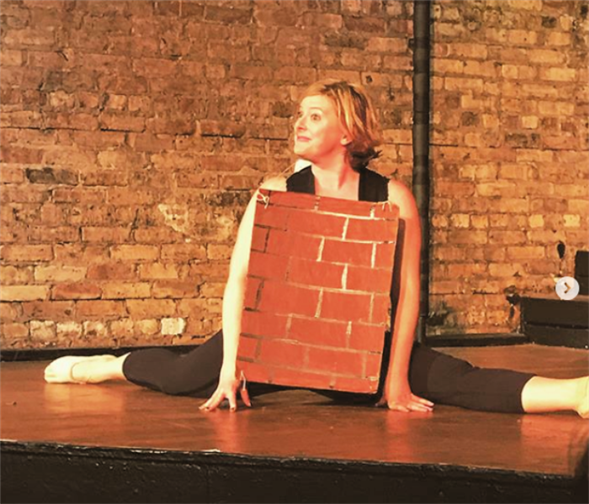Translate Page

How one Chicagoan is pursuing dual theatre careers on both sides of the footlights
---
My hand hovered over the send button, my mind racing: should I? More theatrically speaking: to submit, or not to submit, that is the question.
Most actors don't hesitate to submit for auditions -- putting our head shots, résumés and special skills out there is how we get gigs. Our business is one of hope and heartbreak, as well as late nights and low pay (often no pay) as we work our way up to quitting our day jobs or just playing Hamlet in the basement of a church.
Yet recently, I found myself hesitating to submit for a show for a reason: I hated the last play the company did. And I wrote about how bad it was… for money.
Being an actor and a critic is complicated.
When I was in eighth grade, I listed "theatre critic" as my career ambition in the yearbook. I loved acting in plays but I loved writing about them more, though at that point my experience was purely amateur, banging away about community theatre fare on my family's shared desktop for exactly no one to see. A few years later during the college search, I realized that reviewing plays wasn't something you could major in, so I wondered, could one really make a living as a theatre critic?
Pushing my adolescent aspirations aside, I proudly checked the theatre major box on every application -- because we all know every actor makes a ton of money.
A year after receiving my dual BA in theatre and communications from Loyola University Chicago (where my classmates included Once Upon a Time's Jennifer Morrison and playwright Philip Dawkins), I decided to go to law school, having figured out that no, most actors do not make a ton of money.
After graduating, I fell into the nonprofit arts world. (My résumé is nothing if not scattershot.) A colleague, who doubled as a theatre critic and freelance writer, started reading the pop-culture blog I started from my cubicle one bored Monday morning, and recommended I start a side hustle of my own.
A few months and two interviews later, I started reviewing theatre.
Chicago is a funny city: The theatre community is both formidable (we have Equity houses like Steppenwolf and Goodman, and host lots of pre-Broadway tryouts) and incredibly tiny. I see the same actors over and over. Sometimes they know my face, sometimes they don't, but they sure know my words. I've been quoted on posters for companies both big and small, and been screamed at in a lobby for calling a play misogynistic.
The longer I wrote about theatre, though, the more I realized I missed being on stage. But surely companies wouldn't cast somebody who'd reviewed their work.
Or would they?
In early 2017, I tried an experiment: I submitted for a small production of A Midsummer Night's Dream. The company was quite young and I hadn't yet reviewed them. Many of the ensemble members were new to the Chicago theatre scene. Just to be safe, I used my first and middle name when auditioning, omitting my last and crossing my fingers that they didn't Google me. Several weeks later, I was playing Tom Snout also known as the Wall and Cobweb at alternating performances.
The truth came out early in the rehearsal process, as I was required to give my availability. I could have just said, "I have to work" (because reviewing plays, while often fun, is definitely work), but I figured I'd come clean before someone found out. Luckily, my director was good with it, even admiring that I did both.
Since Midsummer, I've acted in Shakespeare and Chekhov productions, and even earned Equity Membership Candidate status after Robert Falls used me in the big crowd scene in a revival of An Enemy of the People at the Goodman this past spring. (I doubt Falls knew that I had panned his Measure for Measure six years earlier.)
Like any actor, I'm called in for some auditions and passed over for others. But when I don't get a call, I always wonder, am I the wrong type, or do they know I'm a theatre critic? I'm sure that sometimes it's the latter -- and I can't blame them. Being on the other side of it has brought home the fact that actors, directors and designers put their hearts and souls into productions, whether the budget is hundreds of thousands of dollars or just ten. If a company only knows Critic Lauren, who is paid to speak her mind, rather than Actor Lauren, who generally goes with the flow unless something's really problematic, do they really want to invite the former into their inner sanctum?
While I get it, I think my years reviewing theatre have made me a better actor. When I make character choices, I can better assess what works and what doesn't, and I have a newfound respect for directors and stage managers, and all they do to ensure a production goes right. It works the other way as well: My time on stage has left me in awe of actors, their dedication and constant hustle.
So far, straddling both sides of the footlights seems to be working out. That's why, to submit, or not to submit really shouldn't be a question for me.
After staring at my screen for a moment, my hopeful head shot and résumé next to my folder of theatre reviews, I decided to hit send.
Two weeks later, I booked it.
---
Follow Lauren Emily Whalen on Instagram @laurenemilywrites. Follow TDF at @TDFNYC.
Top image: The author as the Wall in A Midsummer Night's Dream. Photos courtesy of the author.
TDF MEMBERS: Go here to browse our latest discounts for dance, theatre and concerts.